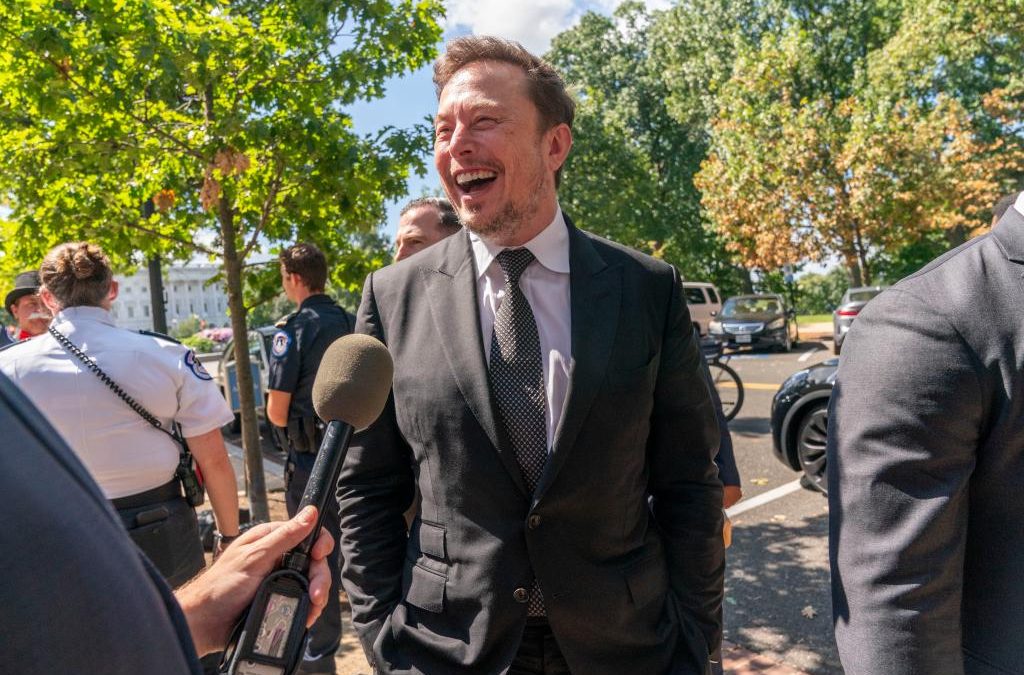Billionaire Elon Musk called for an artificial intelligence “referee” on Wednesday as tech tycoons and lawmakers met for a closed-door summit in Washington, D.C. to discuss the best way to regulate the burgeoning technology.
Organized by Senate Majority Leader Chuck Schumer, Musk was joined by OpenAI CEO Sam Altman, Google CEO Sundar Pichai, former Microsoft boss Bill Gates, Meta CEO Mark Zuckerberg and more than 60 US senators.
“It’s important for us to have a referee,” Musk told reporters, on the sidelines of the summit, adding that regulations were needed “to ensure that companies take actions that are safe and in the general interest of the public.”
Musk referred to AI as a “double-edged sword” that could bring major benefits or have disastrous consequences for humanity — repeating a frequent warning that he and other tech bigwigs have given in recent months.
Meanwhile, Zuckerberg said Congress “should engage with AI to support innovation and safeguards.”
“This is an emerging technology, there are important equities to balance here, and the government is ultimately responsible for that,” Zuckerberg said, arguing that it is “better that the standard is set by American companies that can work with our government to shape these models on important issues.”
The meeting occurred as a growing number of AI critics, from lawmakers to those in Hollywood, calling for federal regulation to stave off any disastrous consequences, including a rise of deepfake content ahead of the 2024 election.
Key issues under consideration include AI’s impact on the US economy, including its potential to cause sweeping job losses in Hollywood and other sectors.
In his opening remarks, Schumer described the meeting as the start of “an enormous and complex and vital undertaking: building a foundation for bipartisan AI policy that Congress can pass.”
“Congress must play a role, because without Congress we will neither maximize AI’s benefits, nor minimize its risks,” Schumer added.
Lawmakers from both sides of the aisle expressed support for some kind of AI-related legislation in the months and years ahead. However, the exact composition of that legislation — and a timeline for its passage — is still unclear.

“Are we ready to go out and write legislation? Absolutely not,” Republican Sen. Mike Rounds said. “We’re not there.”
The meeting’s closed-door format drew some harsh words from Republican Sen. Josh Hawley of Missouri, who questioned whether it would yield any actual progress on the AI issue.
“I don’t know why we would invite all the biggest monopolists in the world to come and give Congress tips on how to help them make more money,” Hawley said.
During the discussion, Musk, who launched his own artificial intelligence startup called xAI in July, expressed concern about the development of so-called “deeper AI” with human-like data processing capabilities.

Musk “raised concerns about data centers so powerful and big that they could be seen from space, with a level of intelligence that is currently hard to comprehend,” Bloomberg reported, citing a source familiar with the matter.
Meanwhile, the Tesla CEO and X owner reportedly downplayed concerns about risks associated with self-driving technology, which is under active development at his electric car company and its competitors.
“This is an important, urgent, and in some ways unprecedented moment,” added Altman, who spoke to reporters ahead of the meeting. The success of OpenAI’s ChatGPT kickstarted Congressional scrutiny over the technology.

Musk appeared in the same room as his rival Zuckerberg for the first time since plans for their highly anticipated “cage match” appeared to collapse last month. At the time, a frustrated Zuckerberg declared that Musk wasn’t “serious” about participating in a bout.
Earlier, Musk was mobbed by a crowd of reporters and other onlookers as he entered the summit.

In March, Musk was one of hundreds of AI experts who publicly called for a six-month pause in AI development – warning the potential risks of unrestrained advancements ranged from the spread of misinformation to “loss of control of our civilization.”
Elsewhere, Altman has called on Congress to impose guardrails on the AI industry, though he has downplayed concerns about job losses.
In May, the OpenAI boss co-signed a short statement that placed the risks of AI on par with nuclear weapons and pandemics.
With Post wires
Source




